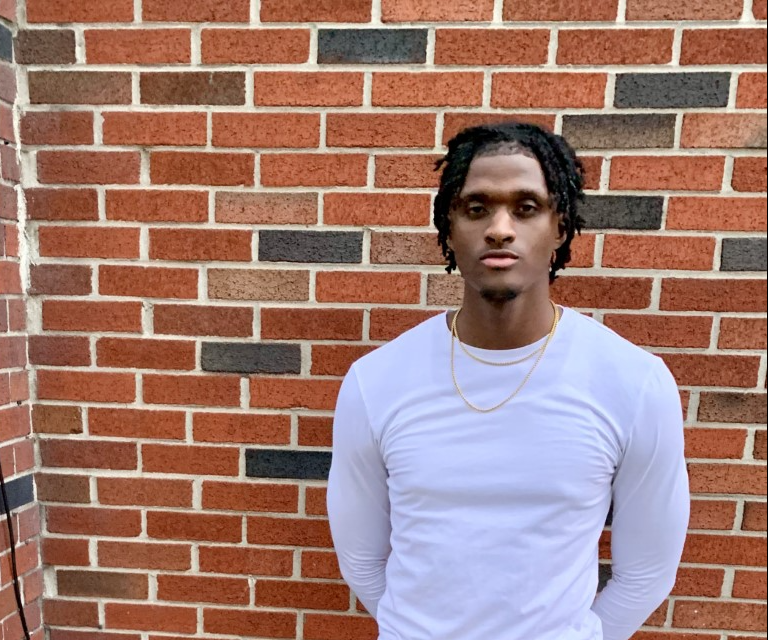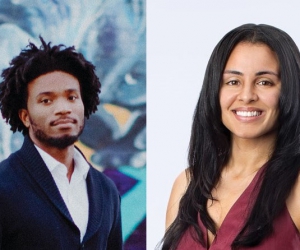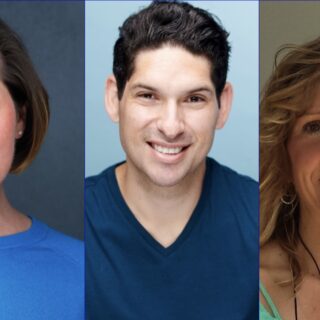
CASE Student Cultivates Lifelong Learning as Student-Teacher
Simeon McCray, from Norristown, Pennsylvania, is a fifth-year student in the Combined Accelerated Studies in Education (CASE) program. In this Q&A, he discusses his student teaching experience, the connection he feels with students, and how he avoids teacher burnout. His quotes have been edited for length and clarity.
How did you choose the CASE program?
McCray: I came to Pitt as an undergraduate student not really sure what to study. I’ve always been cool with kids and I had some good relationships with teachers so I went to a presentation about the CASE program. Once I knew that education was what I wanted to do, I got into a groove. I felt really welcomed and valued in the CASE program and the School of Education. The program gave me a sense of purpose to complete my degree. The CASE program works for me because it provides an opportunity to earn so many different credentials. I’ll graduate with a Bachelor’s in Applied Developmental Psychology, a Master’s in Education, plus K-4 and Special Education K-8 teaching certifications. So, I felt comfortable committing to the program knowing that I’ll have so many options when I finish.
Among teachers in the U.S., Black males are underrepresented. Why is it important for there to be Black male teachers?
McCray: There are a lot of misunderstandings about Black children. They are overrepresented in suspensions and detentions, which often gives them a negative view of school. I feel a connection with my students. As certain things happen in this country, as a person of color, you just share that understanding. The children appreciate when they see someone who looks like them and who understands some of the things they might be going through at home. It’s like saying, ‘If you had a bad day, or you didn’t eat last night, I’m not going to yell at you.” I understand where they’re coming from. It’s hard to put in words. It’s a feeling; it’s a shared experience. Students could benefit from more diversity in classrooms right now because the field of teaching is made up of more than 70% white women.
What have you gained from your student teaching experience?
McCray: My first student teaching experience was at Faison K-5, a predominantly Black school. I was with Miss Katie’s class. I really connected with the students there. This year, I’m student teaching at Fanny Edel Falk Laboratory School. Their philosophy of teaching is top-tier. They treat students with respect and hear their voices. I’m paying attention to their philosophies because whatever school I teach at, I want to take that with me. For example, I get to integrate inquiry-based learning, arts and crafts opportunities, and getting in touch with nature in my lessons. These experiences help kids like school, which cultivates lifelong learners.
What is your best memory from student teaching?
McCray: Towards the end of my student teaching at Faison K-5 School, I helped the kids with a project where they made their handprints with paint. I didn’t know what it was for. On my last day, they surprised me with a book with their handprints and handwritten notes. I’ll keep that book forever.
How do you avoid burnout as an educator?
McCray: I think, as teachers, we have to know what we want to get out of teaching so that we don’t get burnt out. I went to a symposium for Black male educators and they talked about how we often have this “I want to save the world” mentality, but you have to take it slow. One student at a time, one lesson at a time, one day at a time. I’ve been trying to hold on to these moments.
Who has been your support system in your educational journey?
McCray: I wouldn’t be in college without the Upward Bound Program in high school. They helped me understand that good grades could help me get a scholarship; I had my eyes on the prize the whole time in high school. Once I started at Pitt, James Scott, my TRIO Student Support Services advisor, helped me work through my thought process those first couple of years. I had a close relationship with him; he knew everything that I had going on. I have so much love and appreciation for Anna Arlotta-Guerrero, the CASE program coordinator, because she was so flexible with me in the admissions process. She worked with my needs and made it comfortable for me. I’m thankful for my family, friends, and God.
What is something about you that people wouldn’t guess?
McCray: I play the piano!
Learn more
The CASE program is currently accepting applications. Apply here.




